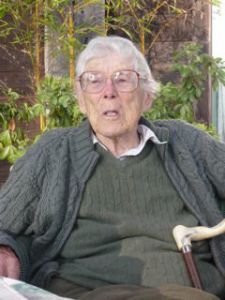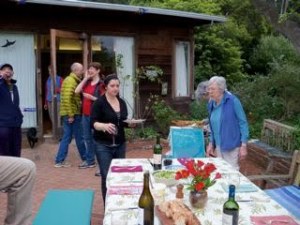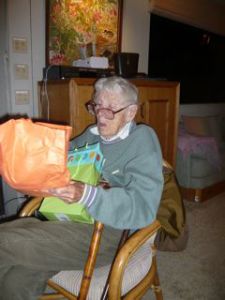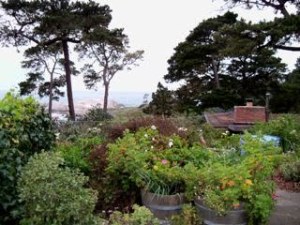Cynthia Criley Williams
November 1, 1915–January 29, 2011
Cynthia Williams’ work, in the 25 years I knew her, was her web. And I don’t mean the electronic kind. She was like a friendly spider from some children’s book, catching almost everybody who wandered up the path to her ramshackle mid-century redwood house overlooking Point Lobos and the ocean. She could be a little aloof at first, but after you were part of the circle, her love was constant. But she wasn’t overly expressive. You just knew. When folks had problems with their parents, they could sit near the fireplace or on the wire ice-cream-parlor chairs and feel her special kind of unconditional love. On all but the rare warm days, there was a fire burning in the fireplace, and everybody was welcome for dinner. Some days there would be only a few, and other nights a dozen or more. Nobody really seemed to plan: Cynthia’s house was like Carmel Highlands’s very own special soup kitchen. Around age 90, she declared she was retiring from cooking and expected others to figure out how to stretch a dinner for two into a dinner for 20. And they did. You might sit next to a famous folksinger, an actor, a judge, an anarchist, a brilliant mathematician, a therapist, a technology millionaire, an out-of-work carpenter, a painter, or somebody’s nephew travelling from a faraway land. Generally, the dull didn’t stay.
Cynthia lived her life on the Monterey peninsula because her father, the painter Theodore Criley, settled in Carmel around the turn of the last century. He was the real deal, one of the original bohemians. His studio faced north for the light and looked west toward Bird Rock. Amazingly, the little wood building has not fallen off the cliff into Gibson Creek. Criley died young, in 1930, and the family sold off some of the parcels of the land overlooking the water. On the high point of the property that remained, Cynthia and her then-husband Russell commissioned a house from her brother, Ted Criley, Jr., a well-known Southern California architect. In this simple home, she brought up her family and helped an enormous number of wayward children of all ages. This most modest of modernist houses provided comfort and a roof to literally thousands of people. The living room was perfect for four or 40 if they spilled onto the terrace.
A few years ago, Cynthia was studying Greek to keep her mind nimble. As I grew portly in the last few years, she would nag me each time I showed up that I needed to lose a bit of weight. She softened the criticism by adding, “We want you around here for a long time.” In her last year, she said, “You look great.” I knew things had gotten fuzzy.
When I saw Cynthia in the fall of 2009, she spoke quite openly about death and said she wasn’t afraid of it. She treated it very matter-of-factly, the way she treated most things. She told a story about an out-of-body experience and said when she came to, she no longer feared death. I never heard her explore the mystical or talk about pop psychology, but she had some kind of faith in what was beyond the visible world.
Around Christmas 2009, she took ill and thought that was the end. Old friends flew in from all over, and the living room was full again. Cynthia rallied through Easter (always a favorite for generations of children looking for eggs). The built-in sofa in the living room was removed and a hospital bed was installed. The parade seemed to keep going. Even though she no longer recognized everybody in the room, she wanted to be where the action was. She wanted to go on experiencing the web she wove. She lasted another year or so, coming in and out of focus.
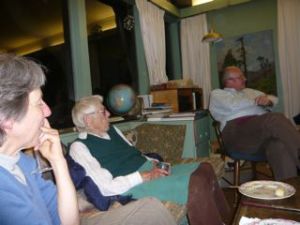
Cynthia with her daughter Molly and composer Paul Crabtree
This Christmas a complete stranger, a young man from Canada, wandered into the living room. After he’d learned he couldn’t camp at Point Lobos, someone suggested he ask if he could pitch his tent at the Williams’s. There was always an extra place for the unexpected wayfarer, and within minutes, he found himself first a guest of honor at a birthday party for our friend Laura and then, the next night, part of the regular Christmas eve caroling and eggnog party. He stayed through the holidays. Cynthia’s way continued even as she faded.
On Christmas Eve during a break in the caroling, I walked past the living room and ran into her son-in-law, Tom. He had been watching Cynthia through her bedroom window. The curtains were open to the view. He remarked how her shallow breathing was like the nearby ocean.
The constant presence of the sea’s rhythm smoothed out some of life’s tragedies. She shared this place and would always say, “It’s not mine. I am just a tenant here.” That was her business acumen showing at the same time as her spiritual side. I was lucky to know her. She was everybody’s favorite grandma.
